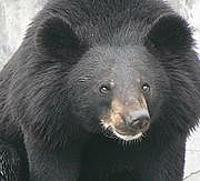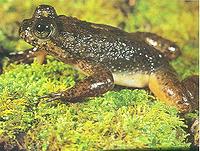 根據一本由超過100位專家所寫的新書指出,除非目前達到警戒狀態的生物多樣性流失速度,可以被控制,否則許多癌症的新療法、新的止痛藥、新世代抗生素,人類免疫缺陷病毒(HIV)、骨質疏鬆症、腎臟衰竭及眼球黃斑部退化的新治療方式、甚至是使肢體再生的方法都可能會化為烏有。
根據一本由超過100位專家所寫的新書指出,除非目前達到警戒狀態的生物多樣性流失速度,可以被控制,否則許多癌症的新療法、新的止痛藥、新世代抗生素,人類免疫缺陷病毒(HIV)、骨質疏鬆症、腎臟衰竭及眼球黃斑部退化的新治療方式、甚至是使肢體再生的方法都可能會化為烏有。
這本書的核心內容在探索醫療上具有價值的7個受威脅生物群體,這些群體包括許多兩棲類、熊、芋螺、鯊魚、非人靈長類、松杉等裸子植物以及鱟(horseshoe crabs)。書中提到如果這些物種滅絕的話,人類健康會受到何種損失。
但是作者們強調,這本書的結論不應該被用來當作施壓的工具,像是針對那些生存已受威脅、脆弱及瀕危野生物種的採獵許可證。相反地,這本書應該成為更多保育工作與改善物種及其棲息生態系管理方式的激發創意來源。
這本《永續生活(Sustaining Life)》是由牛津大學出版社(Oxford University Press)出版,由聯合國環境規劃署(UN Environment Programme, UNEP)、生物多樣性公約(Convention on Biological Diversity)秘書處、聯合國開發計畫署(UN Development Programme)及國際自然保育聯盟(International Union for the Conservation of Nature, IUCN)贊助。
4月23日於新加坡舉行的商業為環境高峰會(Business for the Environment Summit)中公布的研究發現,是這些贊助團體5月於德國波恩市(Bonn)舉行的生物多樣性公約會議之前預先提出的主題。在波恩的會議裡,來自190個國家的代表以及商業界、科學界與非政府組織領袖們,將會共同尋求在2010年前快速減少生物多樣性損失率的行動。
 聯合國環境規劃署總裁史坦納(Achim Steiner)表示:「棲地流失、生態系破壞與衰退、污染、過度開發及氣候變遷都是強烈且持久的衝擊,這些衝擊正在逐步耗損地球的自然資本,這些資本包括全球生物多樣性所包含的醫療珍貴資產。」
聯合國環境規劃署總裁史坦納(Achim Steiner)表示:「棲地流失、生態系破壞與衰退、污染、過度開發及氣候變遷都是強烈且持久的衝擊,這些衝擊正在逐步耗損地球的自然資本,這些資本包括全球生物多樣性所包含的醫療珍貴資產。」
但是專家們警告,許多具有經濟及醫療利益的生物型態,可能在我們能瞭解他們的秘密或是知道他們的存在之前就消失了。共同作者之一的國際自然保育聯盟首席科學家麥克尼利(Jeffrey McNeely)指出:「就在生物為其權益發出物種絕滅的警訊之時,這本書顯示很多物種能夠幫忙救助人類性命。如果我們需要保育物種的更多理由,這本書就提供了很多戲劇性的案例,這些案例傳達了居民為什麼,以及可以用什麼方法來保育而非破壞這些豐富人類生命的物種。」
New new cancer treatments, new painkillers, a new generation of antibiotics, new treatments for HIV, thinning bones, kidney failure, and macular degeneration - even ways to regrow limbs - may all be lost unless the present alarming rate of biodiversity loss is halted, according to a new book containing the work of more than 100 experts.
The core of the book explores seven threatened groups of organisms valuable to medicine, including amphibians, bears, cone snails, sharks, nonhuman primates, gymnosperm trees such as pines and spruces, and horseshoe crabs. It illustrates what is lost to human health when species go extinct.
But the authors stress that the book's conclusions should not be used as a license to harvest wildlife in a way that puts further pressure on already threatened, vulnerable and endangered species. Instead they should be a spur for greater conservation and improved management of species and the ecosystems they inhabit.
The book, "Sustaining Life," is published by Oxford University Press, and has been supported by the UN Environment Programme, UNEP; the Secretariat of the Convention on Biological Diversity; the UN Development Programme; and the International Union for the Conservation of Nature, IUCN.
The findings, announced today during the Business for the Environment Summit in Singapore, come in advance of the next meeting of the parties to the Convention on Biological Diversity set for Bonn, Germany in May. There, delegates from nearly 190 countries as well as business, scientific and NGO leaders will seek to accelerate actions that will cut the rate of loss of biodiversity by 2010.
Introducing the book, UNEP chief Achim Steiner said, "Habitat loss, destruction and degradation of ecosystems, pollution, over-exploitation and climate change are among the powerful and persistent impacts that are running down the planet's nature-based capital, including the medical treasure trove of the world's biodiversity."
But the experts warn that many of the life forms of economic and medical interest may disappear before we can learn their secrets, or before we even know they exist.
Co-author Jeffrey McNeely, chief scientist at the IUCN, says, "While extinction is alarming in its own right, this book demonstrates that many species can help save human lives. If we needed more justification for action to conserve species, this book offers dozens of dramatic examples of both why and how citizens can act in ways that will conserve, rather than destroy, the species that enrich our lives."
全文及圖片詳見 :ENS







